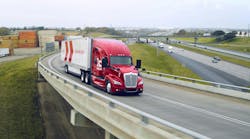Our company, MSM Transportation, is celebrating its 20th anniversary. Twenty years is a milestone for any business, but in trucking, it's monumental. In December 1989, beer cost $1.25 a pint, bacon was $1.81 a pound, and every Monday morning I'd haul two skids from Toronto to L.A. for $1,200. Since then, the price of everything has gone up, except the freight.
When we were starting out, we were small and nimble and opportunities presented themselves every time we turned around. As a sales guy, I loved it.
But I was more than a sales guy, I was a partner in the business. One of my earliest lessons was that while topline revenue drives the salesperson, profit and cash flow fuel the company. That's true whether the economy is up or down. Gross sales don't amount to much when you can't get value — a decent profit — for your work.
It's a simple concept. Revenue quality is better than quantity, yet there's always someone who figures he can build a business by taking a loss on two skids to L.A. How do you fight those guys? Here is some advice:
- Same customer, better revenue
A price increase is just one of many ways to generate a better return from a customer. Can you add more lanes? For instance, “I can hold the rate on lane X but only if you give me lane Y.” Utilization or efficiency can drive up revenue quality, too. You may not need more revenue on a lane if your customer agrees to move his regular pickup from Tuesday to Thursday to better match your available backhaul.
- Don't let topline-driven people set prices
Pricing is based on three factors: costs, the demands of the market, and your company's strategic goals. If your goal as a company is to gain market share, then a low price may serve you well. If you need short-term profits, you can raise rates and drop your low-margin customers.
Unfortunately, freight prices are dominated by a fourth factor: the trucker up the street. If your competitor is driving your pricing decisions, ask yourself this: Is his goal to price you out of business? Senior managers are responsible for goals and strategy, not the sales staff. We've all seen targets set to keep the cash rolling in for the commissioned sales reps, often at the company's expense.
- Explain your greatness
People buy from people, but business is business. It's great that your customer likes you, but can he explain to his boss why your company is the best choice, even if your price is higher? Does he have information about the quantity and quality of your equipment, your safety rating, and your financial health?
Ask your dispatchers, customer service reps and salespeople for examples of outstanding service. For example, Suzie in dispatch hears about how your company's flexibility on a delivery schedule kept a production line humming because she talks to your customer's traffic manager every day. Get into that loop. These tidbits are important when you're making the case for a higher rate or more work.
I know what you're thinking. “There is no way I can talk to my customers about rates now. I'll lose all my business.” Don't be naÏve. Your customers are having the same conversations about what they charge their customers. Whether you're making widgets or hauling them, everyone needs a healthy margin. It's the best way to make sure you have a prosperous 2010 and beyond.
Mike McCarron is managing partner at the MSM Group of Companies, which specializes in transportation and logistics service between Canada and the United States.


